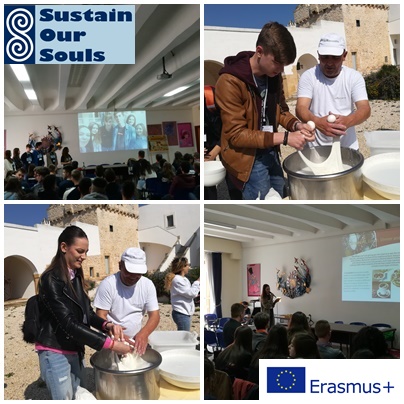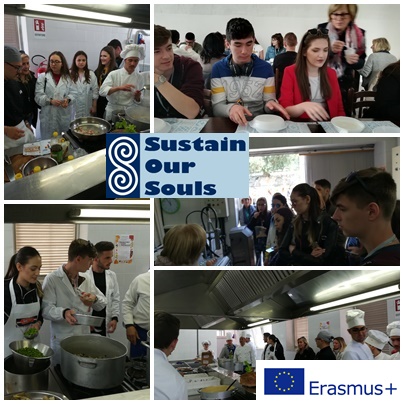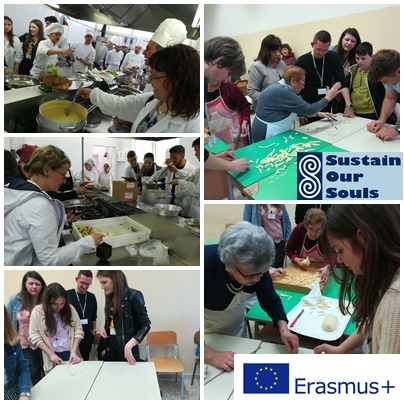”The Art of Eating” was the second mobility for students in the Erasmus+ project in which Romanian, German, Spanish, Greek, Polish and Italian teenagers worked together in multinational teams in order to have better understanding of the European culture and the idea of being an European citizen.
The Romanian team was made of six students, Bogdan Banica, Mara Avramita, Denisa Beatrice Cornelia Tocileanu, Liana Cristiana Ivan, Cristiana David, Stefan Daniel Patru and two teachers, Nicoleta Marilena Militaru and Iulia Magdalena Grecu from Art High School ”Ionel Perlea”, Slobozia, Ialomita. The preparatory activities helped them find more about their own culture and national identity and the information they collected from their research was used in the presentations they had to deliver in the first day and the workshops they had to be part of in the next days. The mobility in Italy gave everybody the chance of finding out more, of being more informed about the partners in the project from other perspectives: eating habits and traditional dishes and menus. Also, part of their research focused on the amount of time they spend having meals at home, in family or with friends rather than going to a fast food restaurant or order takeaway.

”The mobility in Italy was the ideal opportunity for me to discover new cultures and to meet new people and different types of personalities with amazing goals which crossed the borders of Italy, Spain, Germany, Greece, Poland or Romania. The documentary visits we had in Otranto, Lecce and Alberobello helped me understand better both the Italian universe and their cultural heritage.” said Denisa. Working together in multinational teams is one of the main objectives of the project so the students had the opportunity of doing so while visiting the dairy farm where they found out more about km 0 products and they learnt how to make mozzarella and cheese.
The visit to the International Cooking School also gave them an insight on how the products are used in order to make healthy recipes for a daily diet. The lecture they had in school about the principles of the Mediterranean diet was also of great help in providing them with useful material for their research. ”I took part in the chemistry lab where they gave use introductory notions and they involved us in doing some experiments which fully captivated us being connected with the topic of the mobility- a healthy diet.”, said Mara. ”And this was carefully connected with one of the favourite activities”, continued Liana, ”The workshop we had with the grandmothers invited to show us how to make scarcelle and orechiette and also invited us in making this traditional pasta.”

The mobility focused on the way teenagers could connect to one another in different learning environments, the way they used their language skills in order to ensure a good communication among participants and the way they were able to give solutions to different situations. Stefan adds: „I learnt a lot and I also helped others learn. I managed to get out of my comfort area without feeling embarrassed or limited. I was surprised by this as I did not see myself able to do so. The best part is that I connected with other people and I made friends with people of other nationalities breaking the language barriers.” Cristiana adds to this saying that ”the best way to describe the experience in this Erasmus+ project is unforgettable…we knew a lot of new people, we broke the cultural and the language barriers, spending a great week together.”
Also, the project focused on the way in which the eTwinning platform is going to be used in order to carry on different activities related to the Erasmus+ project and the tasks the students will carry on for the next months of the project. The mobility in Spain focused a lot on the way the generations bond to one another, the way the grandchildren spend their time and learn from the elders and this was beautifully illustrated in Italy with the activity carried on with the grandmothers. ”This was the moment in which the gap between generations was overcome- the youngsters learnt from the elders who were happy to share their experience. Everybody was friendly and helpful, no matter the nationality.” adds Bogdan. This leads to a new task to be carried on: finding out more about the way in which the eating habits have changed throughout years and the way the elders can change the bad eating habits of some of the youngsters. The idea is to offer students both a relaxed learning experience and a possibility to learn more about the web tools that can be used in order to collaborate online.

”But what is even more amazing about this experience is the way the teenagers empathise while working together in small groups which became like a little family during the week. What made them connect? I guess it is their enthusiasm, the joy of sharing, and the feeling of responsibility. As for me, my first Erasmus+ mobility was perfect for my career as a teacher: I got to know a new educational system, I got to see different new and original activities and I spent time with my students whom I got to know better and I value them from a different perspective not only from the one I have when I see them in school.”, said Mrs. Grecu when asked about her experience with the Erasmus+ team.
SOS- Sustain Our Souls brings souls together every time we meet in mobilities or we work online, it helps us connect more to other cultures and traditions, it offers us a better understanding of the cultural heritage and how students can benefit from knowing more from this point of view. The Erasmus + project is a complex way of learning, of exploring and breaking boundaries and of becoming more enriched with every step to take.
